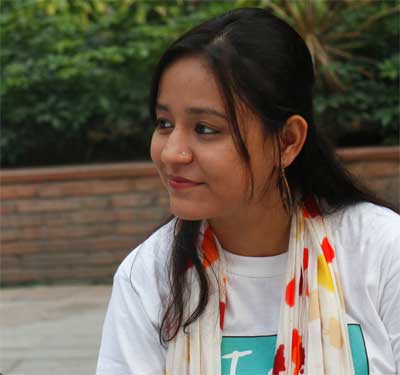My first community visit

Being a part of the administrative staff at FAT, I don’t get too many chances to interact with the girls from the Tech Center, and know little about their struggles. I was asked to go for a community visit to our student, Afsana’s home to find out why she had suddenly dropped out of the EFM project.
Walking through the narrow lane of the Sriniwaspuri Muslim settlement, I was wondering what to say to start a conversation. As I walked up the stairs I was greeted by a family of five who live together in a small, single-room house. As I entered, Afsana’s father immediately walked out of the room. Her mother and elder sisters asked me to sit on the cot, while they sat on the floor. This made me very uncomfortable so I sat on the floor with them. Afsana’s mother said sitting on the floor was their way of showing respect to guests, but I insisted on sitting wherever they sit. I politely asked her mother about Afsana’s sudden absence from the Tech Center. She said it was Afsana’s father who doesn’t like it if his daughters step out of the house after they turn 16. Afsana is 16-years-old now, and her father has decided to discontinue her education. Her elder sisters dropped out of school after grade six. I tried speaking to her father and asked him why he had made such a decision. He politely said that the girls in their community do not study beyond a certain age as all of them will, eventually, have to get married and look after the household, so it’s more important that Afsana should stay at home and learn housework. This statement came as a shock to me. I informed him that I am also from the Muslim community and told him that the Hadith (book containing sayings of the Prophet Mohammed) says that “Seeking knowledge is mandatory for every Muslim.” I also told him the story of the beloved prophet’s wife, Khadija, who was an educated woman and a successful merchant. I wasn’t sure about how convinced he was, but I requested him to rethink his decision, and told him about the activities of the Tech Center, and how Afsana can benefit from them. While leaving I asked her parents to let her continue with class, and I caught a glitter in Afsana’s eyes.
The next day I saw Afsana back in the Tech Center. Now she has started coming regularly. Sometimes her father doesn’t let he go, but she keeps fighting to come. I visited Afsana’s home again to strengthen my relationship with her family. Afsana’s mother also visited the center during the parent’s meet where Risha, our Tech Centre Associate, informed the parents about the upcoming exposure visit to Lucknow. Afsana came to me and said she really wanted to come with us, but she knew her father would never allow it. There were tears in her eyes as she said this, and I promised her that I will come to try and speak to her father.
I told her father about the Lucknow visit, and to my surprise he said that if I am going then he will send his daughter. Though I was delighted to hear this I knew it was a big responsibility. Afsana seemed skeptical about her father’s decision, but I assured her that she would definitely come with us to Lucknow. I called her father a day before we were supposed to leave and requested him to drop Afsana to our office at 4:30 am. This was the first time she had ever boarded a train or was travelling anywhere without her parents. The trip became a life changing experience for the girls.
During another visit to Afsana’s home, I found out that travelling on foot to the Tech Centre from Sriniwaspuri was becoming increasingly difficult for her. FAT has offered to provide travel allowance to the girls of the EFM project. After getting the allowance she became a regular participant at the Tech Centre. I went to her house to speak to her parents about the new class schedule where Afsana would be required to spend more time at the Tech Centre. I was pleasantly surprised to see her father sitting and conversing with me. This time he did not walk out of the room, and he said he had no problem with Afshana going for the classes on weekends.
This, for me, was a big change. A person, who barely spoke to anyone, was sitting with us and talking comfortably. I also spoke to him about FAT’s plan to take the campaign to Bihar, and how Afsana would be required to travel to Patna. He said that he has complete faith in us, and he knew that his daughter was in safe hands.
FAT’s community visits are not a one-time event. It is a process where we establish a relationship with the family members of the girls. For me, this relationship with Afsana’s family is a relationship of trust and empathy which I am going to nurture my whole life. Currently, Afsana is an active participant of the Early and Forced Marriage campaign and has also started going to school again to continue her education.
- Faiza is the Senior Program Associate, Operations and HR
Submitted by admin on Wed, 03/16/2016 - 12:12
- Log in to post comments


